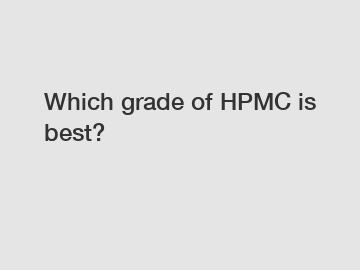Which grade of HPMC is best?
Google Hot Topics: Which grade of HPMC is best?
Which grade of HPMC is best? This is a common question that arises when considering the use of Hydroxypropyl Methylcellulose (HPMC) in various industries like pharmaceuticals, construction, and food. HPMC, a type of cellulose ether, is widely used for its unique properties and versatility. In this article, we will explore the different grades of HPMC and discuss their applications, benefits, and considerations. So, let's dive in!
1. Pharmaceutical Applications:

- Grade 2910: This grade of HPMC is commonly used in pharmaceuticals as a film-forming agent, binder, and controlled-release agent. It provides excellent viscosity control and enhances tablet disintegration. Moreover, it offers better solubility, making it suitable for various drug release profiles.
- Grade 2208: Another grade extensively used in pharmaceuticals, it acts as a thickening agent, stabilizer, and emulsifier in liquid dosage forms. Its high viscosity enhances suspension properties, making it ideal for oral suspensions, eye drops, and nasal sprays.
2. Construction Applications:
- Grade 4000: This grade is commonly used in cement-based materials such as tile adhesives, grouts, and self-leveling compounds. Its main advantage lies in its water retention properties, which prevent premature drying and ensure optimal hydration of cement. Additionally, it improves workability, enhances adhesion, and reduces cracking.
- Grade 75M: Ideal for cement-based renders, plasters, and putties, this grade offers improved workability, sag resistance, and better adhesion. It also helps to reduce water absorption, resulting in improved durability and weather resistance of construction materials.
3. Food Applications:
- Grade 5MP: This grade of HPMC is popularly used in the food industry as a stabilizer, thickener, and film-forming agent. It provides excellent heat resistance, making it suitable for bakery products, frozen desserts, and sauces. Additionally, it enhances texture, shelf-life, and acts as a fat replacement in low-fat food products.
- Grade 2906: Commonly used in dairy products, this grade of HPMC helps to stabilize and improve the texture of products like yogurts, ice creams, and creams. It prevents moisture migration, reduces syneresis, and offers a smooth mouthfeel.
When considering the choice of HPMC grade, several factors should be taken into account:
- Application-specific requirements: Different grades have different functionalities, so it is important to choose the grade that best suits the intended application.
- Viscosity requirement: The viscosity of HPMC grades varies, and selecting the appropriate viscosity is crucial to achieve the desired product characteristics.
- Compatibility: HPMC should be compatible with other ingredients to ensure stable formulations and optimal performance.
- Regulatory considerations: Different grades of HPMC may have specific approvals or certifications suitable for certain industries or regions. Compliance with regulatory guidelines is essential.
In conclusion, the choice of the best grade of HPMC depends on the intended application and specific requirements. Each grade offers unique properties that contribute to its suitability in various industries. Understanding the functionality, advantages, and considerations of different HPMC grades is vital for selecting the right one to achieve the desired outcome. So, whether you are formulating pharmaceuticals, constructing buildings, or developing food products, choose the grade that best fits your needs and unlocks the full potential of HPMC's versatile properties.
Remember, understanding the grades of HPMC is crucial when selecting the best one for your specific needs. So, which grade of HPMC is best for you?
The company is the world’s best ceramic adhesives HPMC suppliers, OEM HPMC cellulose, HPMC for mortar supplier. We are your one-stop shop for all needs. Our staff are highly-specialized and will help you find the product you need.
185
0
0

Comments
All Comments (0)